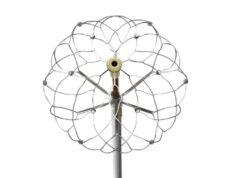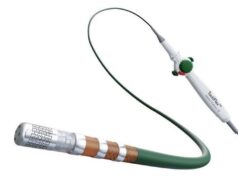
Medtronic has announced it has received US Food and Drug Administration (FDA) approval for its Micra Transcatheter Pacing System (TPS). The leadless device, which is 93% smaller than conventional pacemakers, provides a safe alternative for pacing without the complications associated with cardiac leads.
“For many years we have been hopeful that a transcatheter pacing solution-with a safety and effectiveness profile on par with conventional devices-would become available, and today Micra has achieved this milestone,” says Dwight Reynolds, regent’s professor and chief of the Cardiovascular Section at the University of Oklahoma Health Sciences Center, Oklahoma, USA, and principal investigator in the Micra TPS Global Clinical Trial.
“As the first leadless pacemaker, Micra offers a new option for patients considering a single chamber pacemaker device, which may help prevent problems associated with the wired leads,” says William Maisel, acting director of the Office of Device Evaluation at the FDA’s Center for Devices and Radiological Health.
The device, which is implanted from the femoral vein and fixated in the right ventricle, demonstrated positive results with wide margins of safety and efficacy in the Micra TPS Global Clinical Trial. Results of the trial showed successful implantation in 99.2% of patients, and no dislodgements.
Data from the Micra TPS Global Clinical Trial also demonstrated that 96% of patients (700 of 725; six-month Kaplan-Meier estimate) experienced no major complications, which is significantly fewer-51% fewer-major complications than seen in patients with conventional pacing systems (hazard ratio: 0.49; 95% CI, 0.33 to 0.75; P=0.001). Major complications included cardiac injuries (1.6%), complications at the groin site (0.7%) and pacing issues (0.3%).
Almost all patients, 98.3% (292 of 297), had low and stable pacing thresholds at six months, yielding projected average longevity for the device of more than 12 years.
Micra TPS is the first and only transcatheter pacing system to be approved for both 1.5 and 3 Tesla (T) full-body magnetic resonance imaging (MRI) scans.
The Micra design incorporates a retrieval feature to enable retrieval when possible; however, the device is designed to be left in the body. For patients who need more than one device, the Micra TPS was designed with a unique feature that enables it to be permanently turned off so it can remain in the body and a new device can be implanted without risk of electrical interaction.
The Micra TPS received the CE mark in April 2015 based on early data from the Medtronic Micra TPS Global Clinical Trial. It is intended for use in patients who need a single-chamber pacemaker.
The device also allows patients to be followed by their physicians and send data remotely via the Medtronic CareLink Network; the company announced that remote monitoring of Micra devices is expected to be available later this year.
St Jude Medical, developer of Nanostim, another leadless pacing device, announced that it continues working with the FDA for approval of its device.









